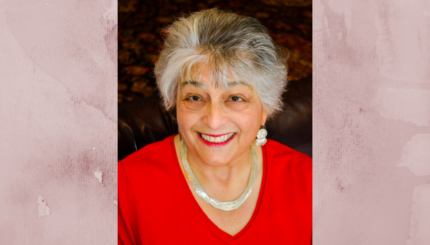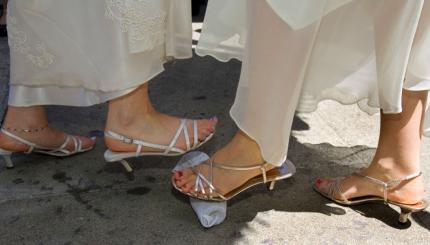Michal Dicker shares her compelling story of growing into her Orthodox feminist identity. She originally submitted this essay to gain admissions to Barnard College, where she is now a senior, about to submit her senior thesis on the agunah crisis.
“Like mother, like daughter.” This comment often embarrassed me, as I tried to fit in with the girls in my Jewish Orthodox community. I strove to be anything but different—a futile endeavor. Despite my gregariousness, and social graces, my trendy outfits and popular rank, I was branded with an “F”—feminist—thanks to my progressive mom. As I grew older, I thought that I could remain impervious to her convictions but, fortunately for me, I failed. The vast majority of my mom’s opinions began to seem logical. To my own surprise, I found myself advocating her beliefs—specifically in my middle school Judaic classes, where the concept of equal opportunity barely existed. The stirrings of my feminist notions were conceived in a rather convoluted and unconventional manner.
In a class of twelve rambunctious girls who loved to get riled up, I became the resident feminist advocate. Initially, because of my expertise in the field of modern Orthodoxy, and being full of “leftist ideas,” I was the logical choice to play devil’s advocate with our ultra-Orthodox teachers who often stressed male superiority. To the astonishment of my classmates, I grew into the role; what were once strictly my mom’s thoughts and teachings, became my own. The debate with my teachers became a personal crusade to communicate the perspective of my centrist world. Most important to me was advocating the study of Talmud by girls and women, because the Talmud is the foundation for the development of Jewish law (
halakha
), to which both men and women are subject. I publicly confirmed my feminist beliefs when I took the plunge and read from the Torah to mark my bat mitzvah, a ritual recently revived by some Orthodox women. Although eager to advocate my beliefs, I was unprepared for the social ramifications. Much to my chagrin, I officially became known as “radical”, and I feared ostracism from my peers. I had not yet read The Scarlet Letter, and did not appreciate the concept of a modern-day “Hester.” Despite my display of independence, my good friends did not abandon me.
As I reflect upon this time, I now recognize the crucial role that it played in my personal development. I learned the importance of being psychologically independent; after voicing my “liberal” views, I could not assume that I would be supported. Like my former self, my friends aimed to blend in; many quickly deemed what they did not understand as “erroneous,” a fallacious mindset that still prevails in Jewish Orthodox communities. My indifference to peer pressure proved to be one of my most powerful tools. Both in the classroom and socially, I did not give in to my teachers and peers who did not want to understand. Those who stood by me taught me the importance of genuine friendship.
During this tumultuous time, I also discovered my passion for the pursuit of knowledge—and my adamant refusal to accept anything as fact without research. I attended feminist conferences, joined the Jewish Orthodox Feminist Alliance, and became dedicated to educating myself and my peers on topics that related to women’s ritual participation and leadership opportunities in Orthodox Judaism. As I entered high school and gained equal access to Judaic texts, I was further inspired to continue on a feminist path. Armed with this power of knowledge and the support of my true friends and family, I have learned to feel comfortable with myself, and confident about my convictions. Now the phrase–“like mother, like daughter”– is the highest form of praise and a badge I wear with pride.
Michal submitted this in response to our call on Facebook for college application essays about Orthodox feminism. If you’ve got an essay sitting somewhere in your files that you’d like to share, send it on over to thetorch@jofa.org.
Like this post? Join the conversation through MyJewishLearning’s weekly blogs newsletter.
Talmud
Pronounced: TALL-mud, Origin: Hebrew, the set of teachings and commentaries on the Torah that form the basis for Jewish law. Comprised of the Mishnah and the Gemara, it contains the opinions of thousands of rabbis from different periods in Jewish history.
Torah
Pronunced: TORE-uh, Origin: Hebrew, the Five Books of Moses.



